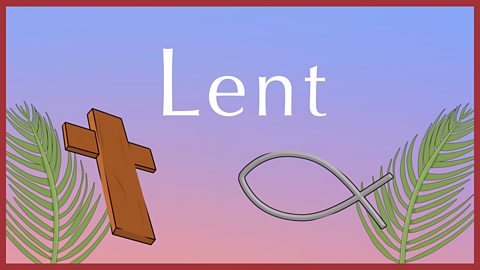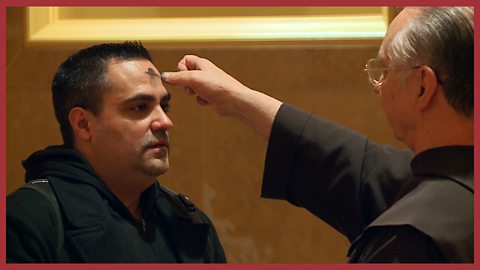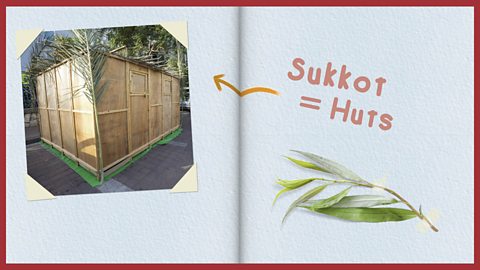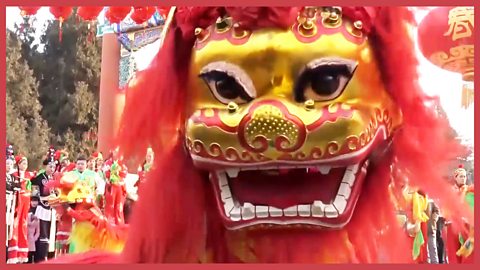Themes: the Christian festival of Lent; Shrove Tuesday and Ash Wednesday; making a sacrifice.
Summary: This assembly celebrates the Christian festival of Lent - the forty days preceding Easter. The video begins by explaining that the forty days of Lent mirror the forty days Jesus spent in the wilderness, where he overcame temptation from the devil. The video then moves on to some of the customs associated with Lent, including Shrove Tuesday and Ash Wednesday.
Resources: The framework to download / print (pdf), an illustration of symbols associated with Lent and a photograph of an Ash Wednesday service.

The video
The festival of Lent is a special time in my religion.
Lent is the period of 40 days leading up to Easter - which is the most important festival in the Christian calendar.
It takes place every year in spring.
Lent is an opportunity for Christians to reflect on our actions and show dedication to our faith, by giving up things we like or enjoy.
But…why would we want to do that?
Well, we believe that a long time ago, our God sent his only son - Jesus Christ - to live on Earth.
The bible says that before Jesus began his work for God, he was led into the desert by the Holy Spirit, to face temptation from the devil.
Jesus spent 40 days and 40 nights wandering the desert without food and he was very hungry.
The devil appeared and tempted Jesus to turn stones into bread. But Jesus refused. He told the devil: Human beings cannot live on bread alone, but need every word God speaks.
So the devil tried again. He took Jesus to a big temple, and tempted him to jump from the building in order for angels to catch him, so everyone could see he was the Son of God. But Jesus refused again. He told the devil: Do not put the Lord your God to the test.
So the devil tried one last time. He offered Jesus all the kingdoms in the world, in exchange for worshipping him. But Jesus refused once more. He told the devil: Worship the Lord your God and serve only Him!
Jesus had resisted temptation and proved his dedication to God. The devil left and Jesus was rescued by angels.
By observing the 40 days of Lent today, we remember the 40 days Jesus spent in the desert. And we copy his sacrifice by giving up something we love for six weeks - like our favourite foods, or activities. We call this our Lenten Sacrifice.
The day before Lent begins is called Shrove Tuesday. Also known as Mardi Gras. Or Pancake Day in the UK!
Shrove Tuesday is a day to say sorry to God for our sins and decide what to give up for Lent. But it’s also the last opportunity to enjoy our Lenten Sacrifices before we give them up - so it’s a celebration, too.
Traditionally, people gave up things like eggs, milk and butter. These would go off before Lent had passed, so people made pancakes to use up the ingredients. Which is why we make pancakes on Shrove Tuesday today!
The day after Shrove Tuesday is called Ash Wednesday. This marks the beginning of Lent. On Ash Wednesday, many Christians attend a special church service, where they are marked with a cross of ashes on their forehead. The cross is meant to remind us of our sins, and symbolises our dependence on God.
After Ash Wednesday, we observe the first five weeks of Lent by keeping up our Lenten Sacrifice, praying, and going to Church.
Until we reach week six - called Holy Week - the week Lent ends! During Holy Week, we remember the final days of Jesus’ life with events and church services: Palm Sunday…Maundy Thursday…Good Friday…Holy Saturday. And finally - Easter Sunday!
On Easter Sunday, we celebrate the resurrection of Jesus.
To mark the end of Lent, many people enjoy chocolate easter eggs. The eggs are a symbol of Jesus coming back to life, and the chocolate is a tasty treat after 40 days of going without!
Taking part in Lent brings us closer to Jesus. Which makes Easter Sunday even more special!
Lent is the forty days preceding Easter in the Christian calendar.
It remembers the forty days that Jesus spent in the wilderness, when he was tempted by the devil.
By observing Lent and making a 'Lenten sacrifice' Christians remember and reflect on this period of Jesus' life, prior to the celebrations of Easter.
The video includes a short animation of Jesus in the wilderness being tempted by the devil.
It then moves on to some familiar aspects of Lent - including Shrove Tuesday and Ash Wednesday - before exploring the relationship of Lent to the festival of Easter.
Duration: 4' 28"
Final words: '…which makes Easter Sunday even more special.'
Video questions
- How long is Lent? (Forty days)
- What does Lent commemorate? (The forty days that Christians believe Jesus spent in the wilderness)
- In what ways did the devil tempt Jesus? (Turn stones into bread; to be saved by angels; all the kingdoms in the world)
- What is a 'Lenten Sacrifice'? (Giving something up for Lent, thereby mirroring the sacrifices made by Jesus)
- What is the day before Lent? (Shrove Tuesday - which has also become known as Pancake Day)
- What happens at the end of Lent? (The festival of Easter - a time of celebration and a time to feast!)

Key links
Assembly framework (pdf) document
Download / print the assembly framework ready for use

Image: symbols associated with Christianity and Lent. image
Click to display the image full-size

Image: receiving the cross of ashes. image
Click to display the image full-size


Suggested framework
1. Entry
You could play the instrumental track of one of the 'Suggested songs' - available here.
2. Introduction
Tell the assembly that today they will be finding out about the Christian festival of Lent. Explain to the group that this is an important period leading up to Easter, when Christians show their dedication to God. While they watch the video, ask them to think about the reasons that people often give something up during Lent.
3. The video
Play the video. The duration is 4' 28" and the final words are: '…which makes Easter Sunday even more special.'
4. Time to talk
Ask everyone: Please turn to the person next to you and ask them if they are giving anything up for Lent, and if so, what it is. Or, If you were to show your inner strength by giving something up for six weeks, what would it be?
Then lead a discussion about the video to help children consolidate their learning about the festival and its significance.
- When does Lent take place? (During the spring - specifically, the forty days before Easter)
- Can anyone remember some of the ways the devil tempted Jesus in the desert? (Turn rocks into bread; jump from a building and have angels save him; worship the devil instead of God in return for earthly riches). Follow up with: Jesus managed to resist all of these temptations. What do you think this proved to the devil? (That Jesus' love for God was absolute. Look for an awareness that Jesus only needed his faith in God to sustain him in the desert)
- Why do Christians give up something during Lent? (To remember the 40 days Jesus spent in the desert and copy his sacrifice)
- Why do we traditionally make pancakes on Shrove Tuesday, the day before Lent? (Eggs, milk and butter were common Lenten sacrifices, and would go off in the 40 days of lent - so people made pancakes with them to use them up)
- Can you remember what happens in church on Ash Wednesday? (People are marked on the forehead with a cross of ashes). Follow up with: What does the cross of ashes represent? (It reminds Christians of their sins and symbolises dependence on God)
- What do the chocolate eggs we eat at Easter represent? (The egg represents new life, to celebrate Jesus being resurrected - but the chocolate is also a tasty treat after 40 days of Lent!)
5. Time to sing
Suggested songs from BBC collections below.
6. Opportunity for reflection
Focus your reflection on how giving up something we love can help to make us grateful for what we have. For example:
Sit quietly now and in the stillness think about a luxury that you might give up for Lent…
Think about the fact that many people around the world might never have an opportunity to enjoy that luxury…
Making a Lenten Sacrifice helps Christians show their dedication to God…
And the festival of Lent can teach us all to be thankful for the things we enjoy the rest of the year…
7. Opportunity for prayer
Begin with your usual form of address (Dear God, Dear Lord, Let us pray, etc) and:
We understand that there are times when we may feel tempted.
Give us the strength to resist temptation.
Help us to be grateful for the luxuries we enjoy and to find ways to help those who are less fortunate.
Amen.

Suggested songs
'God is watching over you' (All about our school, no 7)
God is watching over you,
When you lay down to sleep,
When you wake he will keep
Always watching over you,
Now and forever more.God is watching over you,
When you lay down to sleep,
When you wake he will keep
Always watching over you,
Now and forever more.
Now and forever more.
The Lord's my shepherd - Come and Praise, no 56
The Lord's my shepherd, I'll not want;
He makes me down to lie
In pastures green; He leadeth me
The quiet waters by.
My soul He doth restore again,
And me to walk doth make
Within the paths of righteousness,
E'en for His own name's sake.
Yea, though I walk in death's dark vale,
Yet will I fear no ill;
For thou art with me, and thy rod
And staff me comfort still.
Goodness and mercy all my life
Shall surely follow me,
And in God's house for evermore
My dwelling-place shall be.
Song: 'While we live we learn' (All about our school, no 3. Vocal version)
While we live we learn, (while we live we learn,)
While we learn we grow, (while we learn we grow,)
And the more we grow, (and the more we grow,)
So the more we know, (so the more we know,)
And the more we know, (and the more we know,)
Then the readier we will be
For all life's big adventures
And all life's mysteries.
While we live we learn, (while we live we learn,)
While we learn we grow, (while we learn we grow,)
And the more we grow, (and the more we grow,)
So the more we know, (so the more we know,)
And the more we know, (and the more we know,)
Then the readier we will be
For all life's big adventures
And all life's mysteries.
For all life's big adventures
And all life's mysteries.

Other films from this collection
Sukkot. collection
KS1/KS2. The festival of Sukkot; celebrations; the Exodus; being thankful.

Lunar New Year (Chinese New Year) collection
KS1/KS2. Lunar New Year; festivals; celebrating with friends/family.

Holi. collection
KS1/KS2. Spring festivals; celebrations; Hinduism; Holika and Prahlad; Krishna and Radha.

